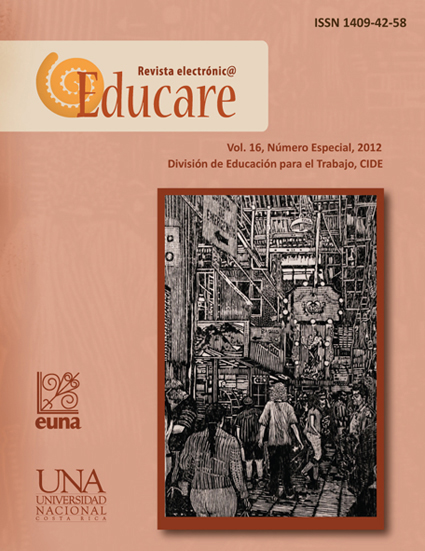Counseling and Diversity: Valuable Education for All
DOI:
https://doi.org/10.15359/ree.16-Esp.6Keywords:
Diversity, counseling, education, everyday activities, discourse.Abstract
In a rapidly changing and complex society full of challenges in all areas, it is vital to introduce new educational paradigms to meet the needs of diverse populations. This paper analyzes the necessity to face this challenge with responsibility, on an ethical framework and through critical thinking on the social realities, bringing attention to Counseling, as a discipline. It discusses the capacity to create inclusive opportunities for all, where inclusive education is seen as an emerging paradigm within a culture of diversity that can applied in our everyday activities.
References
Devalle, A. y Vega, V. (1999). La huella de la escuela abierta a la diversidad (Cap. 1). En A. Devalle
y V. Vega (Auts.). Una escuela en y para la diversidad. El entramado de la diversidad (pp.
-59). Buenos Aires, Argentina: Aique.
Essomba, M. À. (2006). Liderar escuelas interculturales e inclusivas. Equipos directivos y profesora
ante la diversidad cultura y la inmigración. España: Graó.
Freire, P. (1973). ¿Extensión o comunicación? La concientización en el medio rural. España: Siglo
Veintiuno Editores. Freire, P. (2009). Cartas a quien pretende enseñar. Argentina: Siglo XXI.
García, A. y Sáez, C. (1998). Del racismo a la interculturalidad. Competencias de la educación.
Madrid: Narcea.
Gimeno, J. (2005). La educación que aún es posible. España: Morata.
López, M. (2002). Ideología, diversidad y cultura: Una nueva escuela para una nueva civilización.
En Fundación Claudina Thévenet (Ed.), Equidad y calidad para atender la diversidad (Primer
Congreso Internacional de Integración de niños con discapacidad en la escuela común).
Argentina: Espacio Editorial.
Downloads
Published
How to Cite
Issue
Section
License
1. In case the submitted paper is accepted for publication, the author(s) FREELY, COSTLESS, EXCLUSIVELY AND FOR AN INDEFINITE TERM transfer copyrights and patrimonial rights to Universidad Nacional (UNA, Costa Rica). For more details check the Originality Statement and Copyright Transfer Agreement
2. REUTILIZATION RIGHTS: UNA authorizes authors to use, for any purpose (among them selfarchiving or autoarchiving) and to publish in the Internet in any electronic site, the paper´'s final version, both approved and published (post print), as long as it is done with a non commercial purpose, does not generate derivates without previous consentment and recognizes both publisher's name and authorship.
3. The submission and possible publication of the paper in the Educare Electronic Journal is ruled by the Journal’s editorial policies, the institutional rules of Universidad Nacional and the laws of the Republic of Costa Rica. Additionally, any possible difference of opinion or future dispute shall be settled in accordance with the mechanisms of Alternative Dispute Resolution and the Costa Rican Jurisdiction.
4. In all cases, it is understood that the opinions issued are those of the authors and do not necessarily reflect the position and opinion of Educare, CIDE or Universidad Nacional, Costa Rica. It is also understood that, in the exercise of academic freedom, the authors have carried out a rogorous scientific-academic process of research, reflection and argumentation thar lays within the thematic scope of interest of the Journal.
5. The papers published by Educare Electronic Journal use a Creative Commons License:















 The articles published by Educare Electronic Journal can be shared with a Creative Commons License:
The articles published by Educare Electronic Journal can be shared with a Creative Commons License: 



